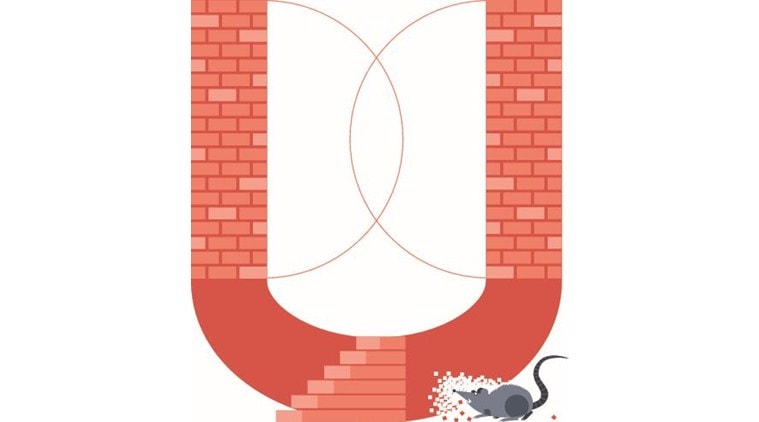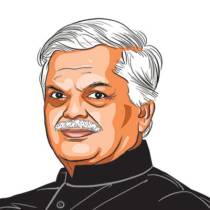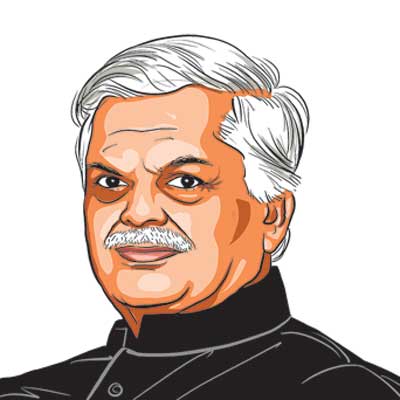Don’t destroy my university
Ideological intolerance and a bureaucratic strait-jacket are damaging JNU. Don’t let a mediocre leadership denigrate one of our finest institutions.

The accusation has been made that JNU as a university has a leftist orientation. Maybe its student population is largely left-of-centre, but this is certainly not true of a majority of the faculty who take great pride in their professional competence. (Illustration: CR Sasikumar)
The Associated Chamber of Commerce (ASSOCHAM) recently put out an estimate of the money spent by Indian nationals studying at universities around the world. The annual outflow of foreign exchange amounts to Rs 95,000 crore. A decade, ago a similar estimate put the figure at less than Rs 20,000 crore.
There are at least four reasons for this sharp rise. First, even toppers with over 90 per cent marks are not getting admission in good colleges in India. So, even undergraduates are going out in the thousands. Second, an increasing number of students may be pursuing lines of study not offered in India. Third, an increasing number of Indians have the money and are willing to spend on their child’s education abroad. Finally, the old Indian fad for “imported” stuff has once again become a virus with a lot of young people imagining that western universities are superior to Indian universities. The last factor has also contributed to a number of private universities affiliating themselves with foreign universities and hiring retired academics from abroad to give the impression that their faculty is as good as any outside India.
While these trends are driven by changing social values, the fact also remains that we in India have systematically contributed to a denigration of our own public universities. It puzzles me that the Ministry of Human Resource Development (MHRD) has consistently ranked the Jawaharlal Nehru University as the second-best university, only after the celebrated India Institute of Science (Bangalore), while the university’s own leadership seems to be doing its best to tarnish its image. The systematic attempt by JNU’s administrative leadership to harass, humiliate and demoralise the faculty has given the public impression that this is a good-for-nothing institution. In time, this will drive out the best of the faculty.
I write with concern as an alumnus who belongs to a generation that deliberately chose to study in India despite the temptation and the possibility to go abroad. Many of my contemporaries took great pride in saying that JNU was as good as any university in the world. This was clearly a nationalist sentiment and the product of our anti-colonial struggle.
The accusation has been made that JNU as a university has a leftist orientation. Maybe its student population is largely left-of-centre, but this is certainly not true of a majority of the faculty who take great pride in their professional competence. I have often said to interlocutors from the Swadeshi Jagran Manch, RSS and BJP that it is their avowed purpose to defend what is Indian and invest in Indian institutions. Hence, they should help build Indian public institutions, not defame and destroy them. The very fact that the MHRD ranking system places JNU at the very top shows that it is one of India’s premier institutions. So why allow mediocrity to run riot in the name of ideology? Why seek to fit into a bureaucratic strait-jacket a university that has flourished due to its plurality and diversity over the years?
Every university has its problems. The issues range from lack of amenities, plagiarism, poor quality research, sexual harassment, faculty moonlighting and faulty and biased recruitment. There’s a larger problem of promoting excellence and ensuring good administration. If this is the state of central universities, state universities are even worse off. Over the years, political and bureaucratic interference has destroyed the quality of administrative leadership. While good academics are quite happy to do their research and teaching and participate in professional activity, they’ve allowed the administrative leadership to pass into the hands of mediocre colleagues and politically connected but incompetent heads of institutions. The rot at the top set in a couple of decades ago. It has now enveloped entire institutions.
It is this crisis of credibility and mediocrity at the top that has brought Indian higher education to the current impasse. I cannot recall when was the last time the Union government had a minister of education who commanded the respect of the academic community as a whole. With successive governments, there has been a lackadaisical approach to the management of the institutions of knowledge creation. This has, on the one hand, been responsible for the decline in the image of public universities and, on the other, has created the space for the growth of privately (Indian and foreign) funded universities.
The “secession of the successful” in my generation referred to those who left India for studies and employment abroad. Today, it would also refer to those who decry and debunk public universities to then go and work in private ones, a few kilometres away from home. The recent exercise to identify Institutes of Eminence has listed three public institutions — two IITs and the Institute of Science. While private universities have been told that they could be included in due course, with one non-existent private university already included, it is surprising that JNU, which tops the MHRD’s best universities list does not figure. As an alumnus, I find this deeply disappointing.
The fact is hundreds of students who have passed out of JNU over the last four and a half decades have distinguished themselves at home and abroad. The university’s admission policy has played an important role in promoting upward social mobility and educationally empowering the economically weaker sections. The most talented minister in Narendra Modi’s cabinet and one of the most active officers of his government are both JNU alumni. I told a senior member of the BJP that as a product of the Indian educational system, never having studied abroad, I wear my “swadeshi” credentials with pride. Let us not destroy what we have built in the name of ideology. Public universities are the lifeblood of modern democracies.
The writer is distinguished fellow, United Service Institution of India, New Delhi and former media advisor to Prime Minister Manmohan Singh
For all the latest Opinion News, download Indian Express App
More From Sanjaya Baru
- Mind games at DoklamIndia is no Philippines. In the Philippines, China managed to declare victory by convincing President Rodrigo Duterte that friendship with China is a better bet…
- Unease of doing businessJudicial intervention in economic activities hurts livelihoods. A developing country can ill-afford such activism..
- Developmental HindutvaIs the term an oxymoron? Is it possible to balance the two in a way that is reassuring to a majority of people? ..








































No hay comentarios:
Publicar un comentario